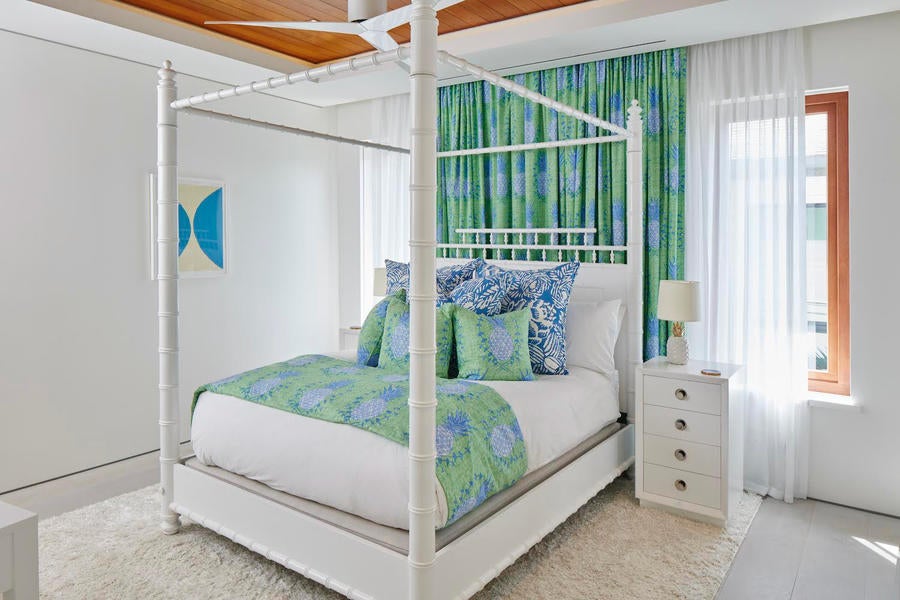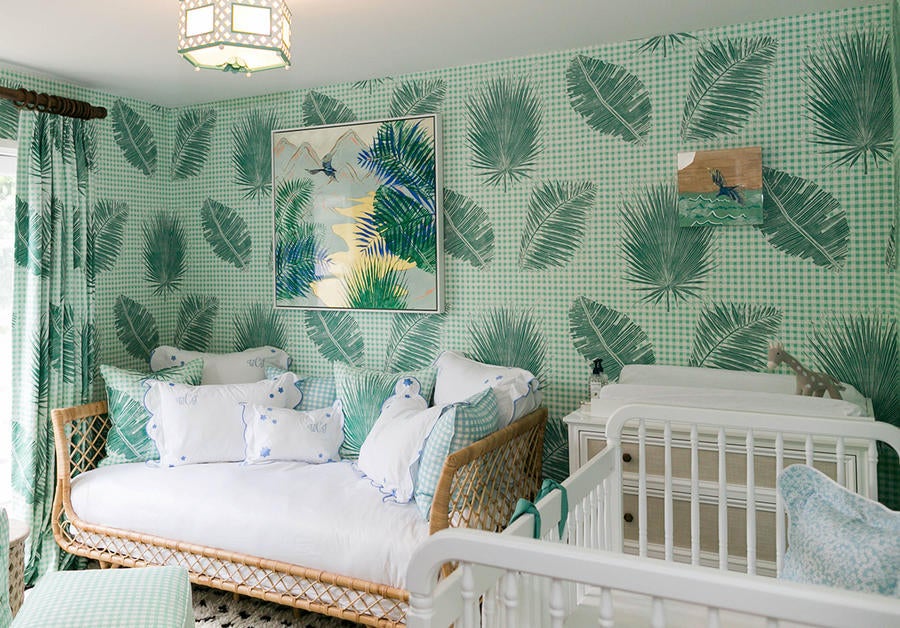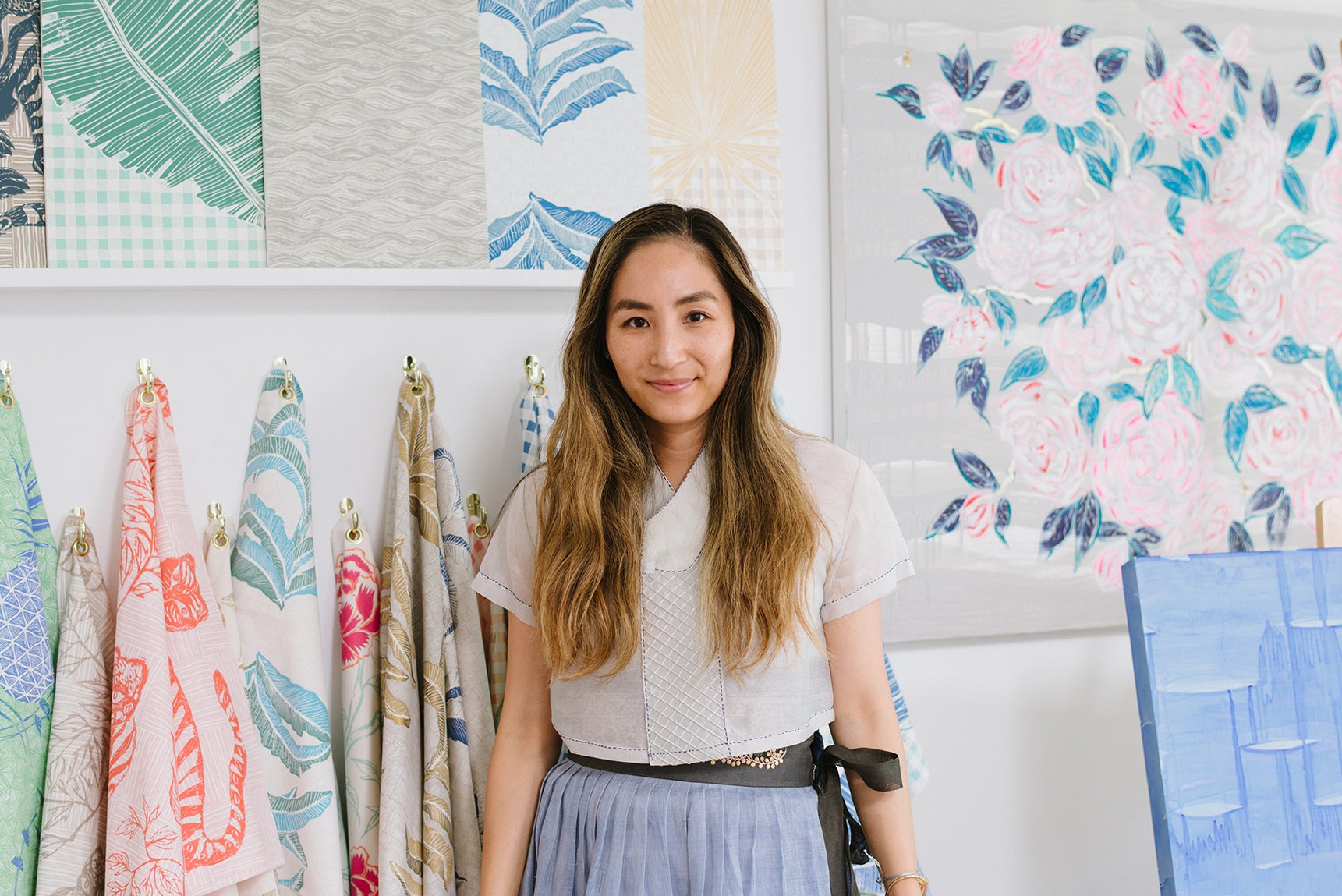When Sharon Lee decided to pull her independent textile brand Krane Home from showrooms and pivot her company to e-commerce in January, she couldn’t know just how prescient the decision would turn out to be. Just weeks before the coronavirus became a global crisis, Lee had taken complete control of her business, lowered her pricing and changed her sampling model. “I guess I have a witchy sense or something, but the timing was definitely great,” she tells BOH.
Lee started Krane Home in 2013 after working as a designer for Michael Smith. Her mother is a Korean folk art painter and she herself had always had a passion for drawing and painting. While working for Smith, she noticed that Korean art was rarely being used in the interiors industry and decided to make it her mission to share a modern interpretation of the art she had grown up with. “My dream is to become the Korean D Porthault,” says Lee. “In Korean culture, the crane symbolizes longevity, and that’s what I want for the brand. I want to still be doing this when I’m 95.”

The pivot to e-commerce wasn’t a sudden one—Lee had begun mulling over the decision to change her business model a few years ago after sensing a frustration among her trade and retail customers alike. The brand encompasses several product categories—wallpaper, fabric, art and pillows—and each was being sold in a different way. Wallpaper and fabric were sold through about a dozen multiline showrooms across the country; a few of those showrooms also carrying Krane Home pillows. The art, meanwhile, was sold directly through the brand’s website. “The process for ordering our products was so piecemeal,” says Lee. “We’ve always had a lot of retail clients, and for them especially, there was a lot of friction in the process.” Lee reached a point where she knew that in order for the brand to grow, she was going to have to figure out a more centralized way to do business.
In January, she relaunched the company’s website, cut prices in half (retail pricing for a yard of fabric now starts at $70; a double roll of wallpaper starts at $200) and added a trade portal where designers could access trade pricing and place their orders. “You don’t have to call us for trade pricing and wait to hear back—it’s all right there,” says Lee. Since the relaunch, Krane Home has seen a boom in retail and trade sales alike.
She also changed the company’s policy on samples, offering them for a refundable fee instead of giving them away for free. Retail clients pay $4 a sample, while designers pay $1. Each sample comes with a return label, allowing the customer to mail it back and get the fee refunded. It’s a shift that’s counter to the prevailing wisdom of transacting with trade customers. “At most textile companies, they’re able to give free samples because the cost is built into your final purchase,” says Lee. “When you buy 10 yards of fabric, you’re also paying for all the samples that the fabric company gave away for free. That never made sense to me.”
Charging for samples allowed Lee to lower the overall price of the textiles, because she’s no longer covering the cost. She also sees it as a more environmentally conscious way of doing business, as returned samples are reused. “We’re not wasting samples on people who may have changed their mind by the time they receive them,” she says. “It’s more eco-friendly and more efficient for us.”
All of the changes that Lee made have a special relevance in the COVID-19 era. In a time when showroom traffic has either been outright stopped or drastically slowed by stay-at-home orders, a robust e-commerce presence is a handy thing to have. However, Lee says the pandemic has only accelerated what was likely to happen anyway. “The design industry can be very stuck in its ways,” she says. “But I’m ready to use technology to my advantage and move my brand forward.”
The idea of transparent pricing is becoming an ever trendier topic in the design industry, and Lee is glad to have gotten ahead of that particular curve. “I think designers used to be afraid of their clients finding out how much things cost, but that seems to be changing,” she says. “Transparency is becoming a more typical way of doing business, and clients understand that if you need to mark something up, that’s how they’re paying for you. They’re choosing to work with you. I think that’s a better way of working.”

Lee also sees the e-design market, which has seen accelerated growth during the pandemic, as informing the future of brands like hers. “These virtual designers don’t even want to deal with purchasing for their clients anymore. It’s an accounting nightmare,” she says. “They want to be able to send a client links and have them buy things directly, and now our site is perfectly set up for that. It’s a side of the business that’s only growing—and clients shouldn’t have to choose from generic brands in order to do e-design. They should have access to showroom-quality brands.”
As for cutting ties with multiline showrooms, Lee feels more in control of her business than ever before. “I have so much respect for showrooms, but I have bigger dreams for my brand,” she says. “It’s healthy and important for brands to have their own voice and their own storefront, whether that’s digital or physical. I think that’s where the industry is headed. How can a brand grow if they don’t have that?”
Homepage photo: Sharon Lee | Photo by Emily Young





























